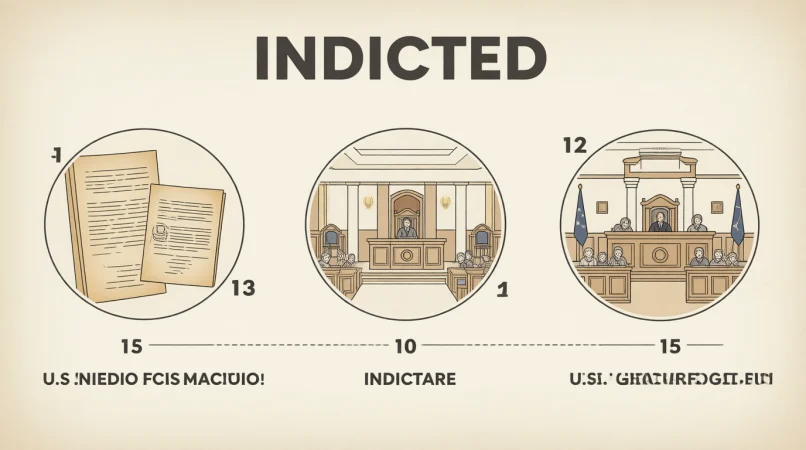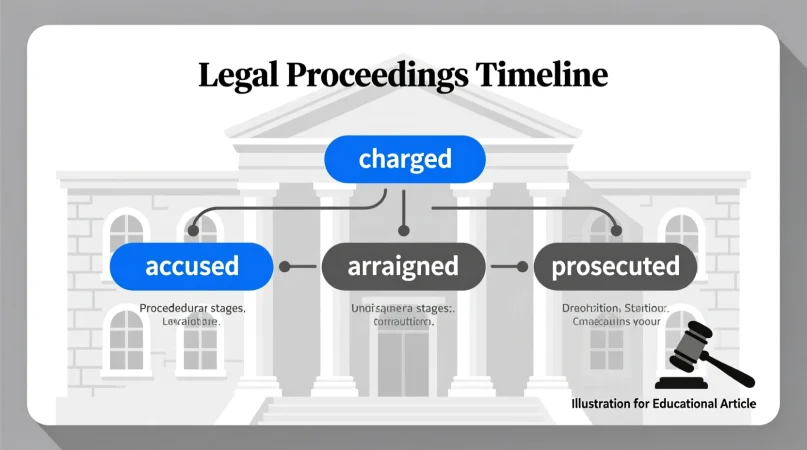Indicted means formally charged with a crime by a grand jury or legal authority. It does not mean the person is guilty, only that there is enough evidence for a formal accusation.
If you’ve ever searched “what does indicted mean,” “what does being indicted mean,” “what does indicted mean in court,” or “what does getting indicted mean,” you might have noticed the explanations can be confusing. Many people assume that being indicted automatically means someone is guilty or arrested, but this is not true.
Understanding what indicted actually means is crucial whether you’re following news stories, studying law, or simply curious about legal terminology.
In this guide, we’ll break down the definition of indicted, its history, how it’s used in different legal and social contexts, common misconceptions, alternative terms, and frequently asked questions — all in clear, easy-to-understand language.
Definitions & Meaning

At its core, indicted refers to a formal accusation made by a grand jury or legal authority that someone may have committed a crime. It’s the first official step in a legal process, but it does not equate to guilt.
Key Definitions
- Indicted: Formally accused of a crime by a grand jury or legal body.
- Being indicted: The state has found sufficient evidence to officially charge someone.
- Indicted in court: A legal action where the accusation is presented publicly or officially in court proceedings.
Examples in Context
- “The politician was indicted for fraud after the grand jury reviewed the evidence.”
- “She is being indicted for tax evasion, but the trial has not started yet.”
- “Being indicted does not mean you are guilty; it only starts the legal process.”
Clarifying Common Queries
- What does indicted mean? — Formally charged with a crime.
- What is indicted mean? — Another way to ask the same legal question.
- Does indicted mean guilty? — ❌ No. Guilt is determined at trial.
- Does indicted mean arrested? — ❌ Not necessarily. Some indictments are issued without immediate arrest.
- Does indicted mean charged? — ✅ Yes, it is a formal criminal charge.
Origins & History of the Word “Indicted”

The term indicted comes from the Latin word indictare, meaning to proclaim, accuse, or declare. Historically, indictments have been part of the legal system for centuries.
Historical Use
- Medieval England: Indictments were formal accusations presented by a jury to the crown or court, initiating prosecution.
- Early United States: The Fifth Amendment established that serious crimes require a grand jury indictment, ensuring due process.
Modern Meaning
Today, indictment is a key legal term used globally, particularly in U.S. and common law countries. It signals the formal start of criminal prosecution but preserves the presumption of innocence until proven guilty.
Usage in Different Contexts

1. Legal & Court Context
In courts, being indicted starts a criminal process.
- Example: “He was indicted in Texas for embezzlement after evidence was reviewed by a grand jury.”
- This stage allows prosecutors to bring the case to trial.
2. Media & News
Journalists often report:
- “The former official was indicted on corruption charges.”
- Here, the term indicates serious legal proceedings but should not imply guilt.
3. Professional & Social Context
Sometimes, indicted is used in casual conversation or commentary:
- “He got indicted? That’s serious!”
- While technically correct, the casual use often misleads people into thinking guilt has been established.
4. Pop Culture & Social Media
In discussions about famous personalities, celebrities, or politicians:
- “After the investigation, the actor was indicted for fraud.”
- Social media users frequently ask: “Does indicted mean arrested?” or “Does indicted mean guilty?”
Common Misunderstandings & Clarifications

❌ Misconception 1: Indicted Means Guilty
Clarification: An indictment is only a formal accusation. Guilt is determined at trial.
❌ Misconception 2: Indicted Means Arrested
Clarification: Some indicted individuals are not immediately arrested. They may surrender voluntarily or be released on bond.
❌ Misconception 3: All Indictments Lead to Conviction
Clarification: Many cases are dismissed, settled, or result in acquittal. An indictment does not guarantee conviction.
❌ Misconception 4: Indictment is the Same in Every Jurisdiction
Clarification: Legal processes vary. For example, indicted in Texas might involve slightly different procedures than in federal courts.
Alternatives & Synonyms

| Term | Meaning | Usage Context |
|---|---|---|
| Charged | Officially accused | Legal, general use |
| Accused | Named as possibly guilty | Informal, legal |
| Arraigned | Brought before court | Court proceedings |
| Prosecuted | Legal action initiated | Court/legal context |
| Summoned | Called to court | Minor charges, procedural |
| Brought to trial | Formal criminal process started | Legal terminology |
These terms overlap with indicted, but none imply guilt automatically.
Frequently Asked Questions (FAQ)
1. What does indicted mean?
Formally charged with a crime by a grand jury or legal authority.
2. What does being indicted mean?
It means a legal process has been initiated with sufficient evidence for charges.
3. Does indicted mean guilty?
❌ No. Indictment is only an accusation; guilt is determined at trial.
4. What does indicted mean in court?
A formal accusation is presented in court to start criminal proceedings.
5. Does indicted mean arrested?
❌ Not necessarily. Arrest may happen later or not at all.
6. What does getting indicted mean?
It means the person is officially charged with a crime and a trial process may follow.
7. What does indicted mean in Texas?
In Texas, it refers to formal charges by a grand jury; procedures follow state law but still do not imply guilt.
Conclusion
Understanding what indicted means is critical in today’s news-driven world.
If reading about politicians, celebrities, or local criminal cases, an indictment signals a formal charge — not guilt, not arrest, and not conviction. It is the legal system’s way of starting the process to determine responsibility through due process.
By learning the term, its origins, legal nuances, and common misconceptions, you can interpret news reports, social media discussions, and court references more accurately.
Remember: being indicted is just the first step in the legal process, and everyone is presumed innocent until proven guilty.

